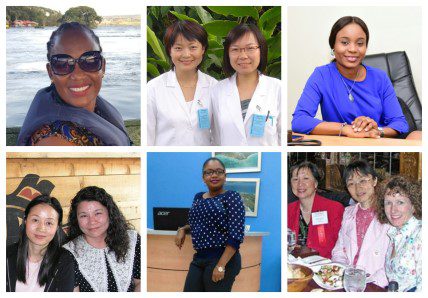In celebration of International Women’s Day, we are proud to highlight the achievements of IAMAT women scholars.
This year’s theme, Gender Balance, highlights the need for gender parity and how we can all play a role to advance the professional, social, and personal success of women. Historically, and still today in some countries, women have been prevented or discouraged from participating in medical fields. Although great progress has been made, supporting health practitioners who are women continues to be our goal, particularly in countries where opportunities for travel medicine training are limited.
IAMAT Scholarships provide travel medicine training to doctors and nurses who need it most. Since its inception in 2002, the program has awarded over 30 scholarships to practitioners working in countries where travel medicine is an emerging specialty. So far, half of IAMAT’s scholarships have been awarded to women from Kenya, Nigeria, China, and Haiti.
IAMAT’s women scholars are family physicians, infectious disease specialists, lecturers, mentors, and travellers who are passionate about improving healthcare in their communities. Through their training, which involves taking intensive travel medicine courses and clinical observations, practitioners gain the skills to provide better care for their patients and expand their professional experience. Past recipients have introduced travel medicine in their practice, become directors of their clinics, founded travel medicine organizations, and improved healthcare standards in their workplace.
Implementing best practices
Upon her return from training with expert travel medicine faculty in Seattle, USA, Dr. Liu Chunfang introduced travel health standards and procedures in her clinic in Shenzhen, China.
“I quickly applied the knowledge I acquired to improve my workplace. I made recommendations to the clinic director on the need to set up a travel medicine clinic for travellers, including pre-travel medical consultations and vaccination, providing advice on how to stay healthy while travelling, and post-travel medical health assessments for those coming back from abroad.”
Providing tailored travel health advice
During their training, practitioners gain skills to provide complex pre-travel consultations and how to attend to the medical needs of travellers.
Dr. Lei Da of Jiangmen, China, learned how to give tailored advice to patients.
“Rather than giving the same information to all travellers, our clinic now provides personalized travel health advice taking into account each traveller’s health need, destination, trip itinerary, current health status and vaccination history.”
Teaching travel medicine
Our scholar from Cap-Haïtien, Haiti, Dr. Weedgina St Vil, is a university professor who teaches travel health to her students and colleagues. She believes that integrating travel medicine in the curriculum will contribute to better health promotion in her country.
“[I teach my students] the importance of travel medicine, including stressing the importance of being up-to-date with vaccines. I will also teach them the topics that are important to travellers such as health risks associated with long plane trips, deserts, cruises, travel insurance, how to better protect yourself from mosquitoes, and how to prevent insect bites in general.”
Responding to cultural and language differences
By training in a cross-cultural environment, doctors and nurses are better prepared to meet the needs of local and international patients. This approach promotes better communication and understanding of a patient’s background and experience, and leads to better relationships between the practitioner and patient.
As Dr. Ye Wei of Shanghai, China, says:
“The IAMAT scholarship has given me a new way to understand and practice travel medicine in my daily work. I provide medical care built on relationships of trust and professionalism. I perform pre-travel health screenings, give vaccinations, and provide medical consultations to patients applying for visas to the US, UK, and Australia. Our patients will be exposed to a different health environment and stay there for quite a long time. Travel healthcare for them is extremely important.”
Expanding travel medicine where you travel
Many of our women scholars are now travel medicine advocates and leaders in their country. In Kenya, where travel medicine is an emerging practice, Dr. Marybeth Maritim has set up her own travel medicine clinic.
“The medical services I will provide for patients will be comprehensive, focusing on empowering the patient to change their behaviour in order to reduce their disease acquisition risk. The most important aspect about travel medicine that I took away from the course and clinical observations in Johannesburg is the need for training more healthcare practitioners in my country about travel medicine.”
Similarly, our most recent scholar, Dr. Yetude Fadipe of Lagos, Nigeria, is president of the newly formed ‘Society of Travel Medicine Practitioners in Nigeria’.
“Setting up a travel medicine society… will without doubt, improve the awareness and practice of travel medicine in the country. Further, I am currently working on a travel health research project as a follow-up to the clinical observation, and I aspire to carry out more travel medicine research in the future.”
Want to support the next IAMAT Scholar? Learn how by clicking here.
Article by: Joanna Poblocka
IAMAT Scholars and friends, clockwise: Marybeth Maritim; Ye Wei and Meng Jing (photo by Johnnie Yates); Yetunde Fadipe; Weedgina St Vil; Elaine Jong, Lei Da, and Sheila Mackell; Liu Chunfang and Sun Huichin.



